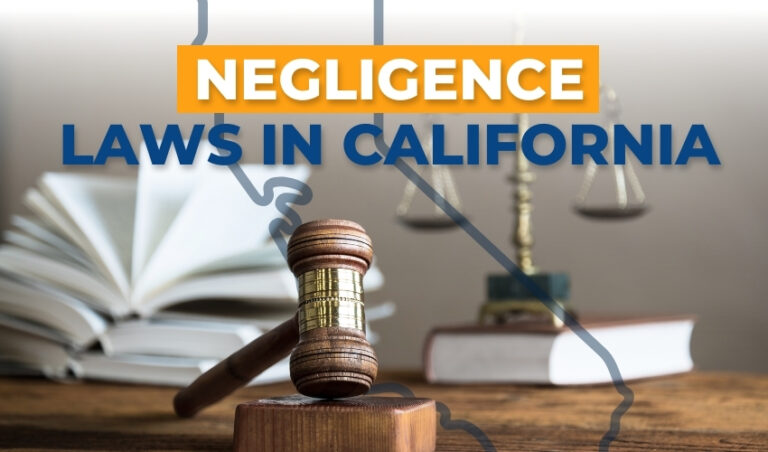As an Irvine personal injury law firm dedicated to protecting the rights of individuals who have suffered harm due to the negligence of others, we believe it is beneficial for California residents to understand the intricacies of negligence laws in our state. Negligence is a fundamental concept in personal injury law, and it forms the basis for many civil cases. In this comprehensive guide, we’ll explore the key aspects of negligence laws in California to provide you with valuable insights that may prove helpful if you ever find yourself in a situation where someone else’s carelessness has caused you harm.
At its core, negligence refers to a failure to exercise reasonable care in one’s actions or omissions, resulting in harm to another person. In California, as in many other states, the law recognizes that we all owe a basic duty of care to those around us. When someone’s behavior falls short of this standard, they may be held legally responsible for any injuries or damages that result from their negligence.
The Elements of Negligence in California
To establish negligence in a California court, four essential elements must be proven.
- Duty: This refers to the legal obligation that the defendant owed to the plaintiff to act with reasonable care. In many situations, this duty is implied. For instance, all drivers on California roads have a duty to operate their vehicles safely and follow traffic laws. Similarly, property owners have a duty to maintain their premises in a reasonably safe condition for visitors.
- Breach of duty: This occurs when the defendant fails to meet the standard of care expected of them in the given situation. For example, if a driver runs a red light or a store owner fails to clean up a spill in a timely manner, they may be considered to have breached their duty of care.
- Causation: To prove causation, it must be demonstrated that the defendant’s breach of duty was the direct cause of the plaintiff’s injuries. This involves showing both “actual cause” (that the injury wouldn’t have occurred but for the defendant’s actions) and “proximate cause” (that the injury was a foreseeable consequence of the defendant’s negligence).
- Damages: For a negligence claim to be valid, the plaintiff must have suffered actual harm as a result of the defendant’s actions. This can include physical injuries, emotional distress, property damage, lost wages, and other tangible or intangible losses.
Comparative Negligence in California
California follows a “pure” comparative negligence system, which means that a plaintiff can recover damages even if they were partially at fault for their own injuries. However, the amount of compensation they receive will be reduced by their percentage of fault.
For instance, imagine a scenario where a pedestrian is hit by a car while crossing the street. The driver was speeding, but the pedestrian was looking at their phone and not paying attention to traffic. If a jury determines that the pedestrian was 30% at fault for the accident and awards $100,000 in damages, the pedestrian would still be able to recover $70,000 (the total award minus their 30% of fault). A personal injury lawyer can help assess your percentage of fault.
Statute of Limitations for Negligence Claims in California
The statute of limitations for most personal injury cases, including those based on negligence, is two years from the date of the injury. However, there are exceptions to this rule. For instance, if the injury was not discovered immediately, the clock may start running from the date the injury was discovered or should have been discovered with reasonable diligence. Moreover, if your negligence claim is against a city, county, or state government agency, you must file an administrative claim within six months of the incident.

Common Types of Negligence Cases
As award-winning attorneys, we encounter a wide range of negligence cases. Some of the most common include:
- Motor Vehicle Accidents: From car crashes to truck collisions, these cases often involve negligent drivers who fail to follow traffic laws or drive responsibly.
- Slip and Fall Incidents: Property owners who fail to maintain safe premises can be held liable for injuries that occur due to their negligence.
- Product Liability: Manufacturers, distributors, and retailers can be held responsible for injuries caused by defective or dangerous products.
- Workplace Accidents: While many workplace injuries are covered by workers’ compensation, there are instances where negligence by third parties (not the employer) may allow for a personal injury claim.
Damages in California Negligence Cases
When negligence results in injury, California law allows the injured party to seek various types of damages. These typically fall into two main categories: economic and non-economic damages.
Economic damages are those that have a specific monetary value attached to them. These can include medical expenses (both current and future), lost wages, loss of earning capacity, and property damage. These damages are typically easier to calculate and prove, as they often come with bills, receipts, or professional testimony regarding future costs.
Non-economic damages, on the other hand, are more subjective and can be more challenging to quantify. These include compensation for pain and suffering, emotional distress, loss of enjoyment of life, and loss of consortium (in cases where the injury affects the plaintiff’s relationship with their spouse). While these damages are harder to put a dollar amount on, they are no less real or important to the overall compensation package.

The Importance of Legal Representation in Negligence Cases
Trying to handle a negligence case can be complex and overwhelming, particularly when you’re also dealing with the physical and emotional aftermath of an injury. Insurance companies often try to minimize payouts, and defendants may try to shift blame or downplay the extent of their negligence.
This is where having legal representation can be beneficial. Attorneys who handle these types of cases are familiar with California negligence laws and can help guide you through the legal process. They can handle aspects of your case such as investigating the incident, gathering evidence, negotiating with insurance companies, and if necessary, presenting your case in court.
Understanding California negligence laws can be beneficial if you ever find yourself in a situation where you’ve been harmed due to someone else’s carelessness. If you or a loved one has been injured due to someone else’s negligence, schedule a free consultation with an Irvine personal injury law firm to learn about the legal options available to you.






